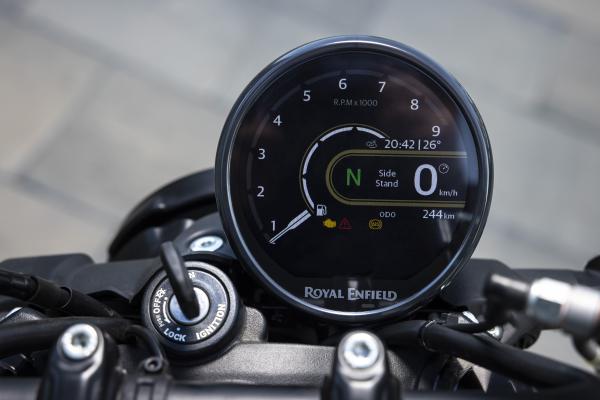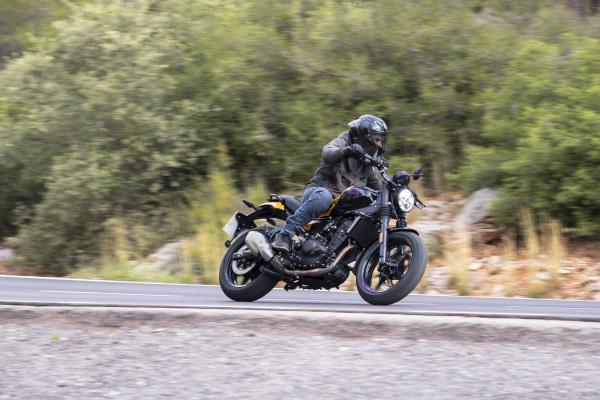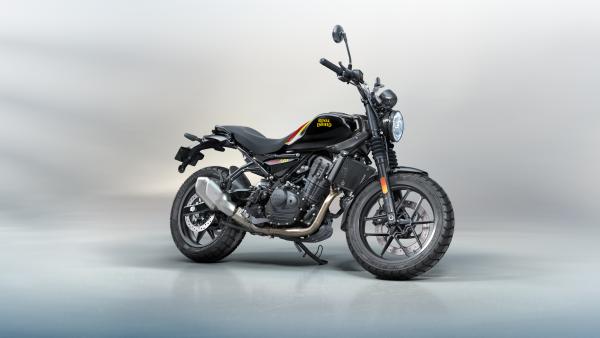Royal Enfield Guerilla 450 Review: It's a Funky, Bargain Roadster
The Himalayan has morphed into a sporty roadster that won’t break the bank, but it might change your expectations.

Member for
54 years 8 monthsAfter the usual drip feed of teasers and a few leaks, we at last have our first proper look at the new Royal Enfield Guerilla 450. Not only that, but we have all the specs and the price to share with you.
The new bike from the Indian company takes the Himalayan and reworks it into a neo-retro naked roadster which now looks like the sensationally popular Triumph Speed 400’s closest rival. Both have reasonably pokey single-cylinder engines, both are made in India, and in terms of price, there’s not much in it.
Royal Enfield Guerilla price and availability
The Guerilla is priced from £4,850, making it a chunk less than the aforementioned Speed 400, and quite a bit less than some of the other bikes in the A2 lightweight segment. Delivery to the UK dealers is expected later this summer. In its native India, the bike costs 239,000 rupees, or the equivalent of just under £2,200. The MSRP in Germany is €5,290 - expect a similar figure in other Eurozone countries.
Guerilla vs Himalayan
Making the most of the money Royal Enfield invested in the development of the Himalayan, the Guerilla uses that bike’s tubular steel frame and ‘Sherpa’ engine, which is a stressed member of the chassis.
The 452cc, liquid-cooled single makes 39.5bhp at 8,000rpm backed up by 29.5lb ft of torque at 5,500rpm, just as it does in the Guerilla’s off-road focused sibling. Beyond that, though, there are plenty of differences. For a start, the engine is fed by a much smaller 11-litre fuel tank, compared to a 17-litre tank in the Himmy.
The Guerilla also swaps the Himalayan’s upside-down fork for a conventional one, while the travel drops from 200mm at the front to 140mm, and 200mm at the back to 150mm. As expected, the 21-inch front has been switched to a 17-inch hoop.
There’s new bodywork in the form of a fresh tank, seat and tail unit, but the display is the same TFT unit used on the Himalayan. It features a USB-C charging socket mobile phone connectivity for proper navigation (not just turn by turn as on many bikes), and can be used to access different riding modes. Lower spec models use a part-analogue gauge cluster which can be accompanied with the four-inch 'Tripper' navigation unit if desired.
Braking is taken care of by a single 310mm disc squeezed by a twin-piston caliper at the front plus a rear 270mm disc with a single-pot caliper, with all of that managed by twin-channel ABS.
The wet weight comes to 184kg, a little more than the 170kg quoted for the Triumph Speed 400.
'A game-changing roadster'
Royal Enfield CEO B Govindarajan had this to say about the new bike:
“The Guerrilla 450 is an absolutely gorgeous and game-changing roadster. When we started with the Sherpa 450 platform, we envisaged an adventure tourer and a superlative roadster that would be distinctly Royal Enfield. The Guerrilla 450 is just that - a roadster full of character and confidence.
"Developed in parallel with the Himalayan, the Guerrilla is tuned to perfection for city riding as well as weekend rides through twisty roads. It has amazing on-road handling, coupled with accessible power delivery, and superb chassis dynamics enhance the character of the motorcycle and offer amazing performance, stability and easy manoeuvrability.
"We’ve had a great time testing this motorcycle and riding it around the world. It really grows on you, and allows you to grow in confidence as a rider”
What’s it like to ride?
The launch ride for this bike might go down as one of the longest single day events I’ve taken part in. We had around 10 hours of seat time ahead, soaring 35 degree celsius temperatures and one of the busiest European cities to contend with. You could say then this was a proper test of the bike and those who are riding it.
The initial part of the ride is the not-so-simple act of threading through Barcelona’s morning rush hour, and as expected, the Guerilla 450 is proving to be as user-friendly and accessible as we’ve come to expect from Royal Enfield. The steering is light and there are acres of steering lock on offer, the rear brake is extremely powerful and the gearbox is accurate and direct. Like with the Himalayan 450, the Sherpa 450 is a supremely easy engine to get along with, offering strong low and mid-range grunt with enough fizz at the top of the rev range to keep you engaged. The clutch lever too has a light feel, although my dinky paws are at full stretch to reach the lever and there is no adjustability on offer - something to keep in mind if you do have smaller hands.
Another thing I’m enjoying about the Guerilla is that despite it looking larger than both the Speed 400 and KTM 390 Duke (it is both heavier than each of those and physically larger in almost every way) the 780mm seat still allows me to completely flat foot at a stop. For taller riders, an enduro seat is available as an option, which might be handy if you want to add some extra legroom.
With rush hour now behind us we finally hit the twisties, and the Guerilla is proving to be a very different animal compared to the adventure bike it shares a number of key components with. The standout feature of the bike is the handling. With much more aggressive front-end geometry, the Guerilla 450 is a sharp turning bike, flicking from left to right quickly yet with a level of composure that has to be credited to the non-adjustable Showa cartridge forks. The high levels of agility don’t mean a lack of stability, either, as with a 1,440mm wheelbase, the bike feels extremely composed in faster sweeping corners and at high lean angles.
I’ve been expecting to run into ground clearance issues on the Guerilla, but with the footpegs hoiked upwards and rearwards, it’s actually very good on that front. You can get the pegs decked out if you want to, but you have to go right to the limit of how far you’d want to push the bike for it to happen.
One handling trait I am noticing is the ability to lock the rear wheel momentarily, even with ABS that apparently can’t be switched off. If you hammer on the rear brake while carrying some lean angle, the rear tyre can lock and kick the bike out sideways, something it’ll continue to do even once the ABS catches up with itself and bleeds out some of the braking pressure. Personally, I don’t have an issue with this, although, for those who prefer the front and rear wheels of their bike pointing in the same direction, it might be something to keep an eye on.
With such a long day of riding (160 miles or so including photo and video stops) I’ve got a very good taste of how comfortable the new bike is, and it’s good news. Seat comfort is great, the riding position neutral, and the footpeg position is just on the right side of sporty. Taller riders might want to try before they by, as with fairly high-set pegs’ it may require a taller seat, but other than that (and the non-adjustable levers) comfort and ergonomics are all good. It’s also surprisingly, for a 452cc single, fairly vibe-free. Locking my legs on the fuel tank will transfer some vibes to me, but the seat, bars, and footpegs feel nicely isolated from the engine.
What technology does it have
If you are looking for a smorgasbord of rider aids, the Guerilla 450 is not the bike for you. Two-channel ABS and two rider modes (which adjust the mapping of the throttle) are basically your lot. You do, though, get the same smart-looking TFT dash as found on the Himalayan 450. That means you get Bluetooth connectivity right out of the box and therefore turn-by-turn and full-screen navigation, calls, texts, and music on the go.
Should I buy the Royal Enfield Guerilla 450
The new Guerilla 450 is launching into a bustling little segment, and will be rubbing shoulders with bikes like the aforementioned Speed 400 and 390 Duke, as well as the Husqvarna 401 Svartpilen, Yamaha MT-03, the BMW G 310 and its cousin the TVS Apache 310 RTR. While the Guerilla is less advanced than nearly all of the bikes mentioned above, its big-bike aesthetic might be something that appeals to riders, especially those above the six-foot mark.
The styling of the bike is also individual enough to set it apart from the pack, with a neo-retro look that is neither as classical looking as the Triumph, nor dystopian as the Husqvarna. It’s also available in a number of bright and vibrant colour schemes - not something you can say about all the other bikes in the segment!
There is another big tick on the Royal Enfield’s report card though, and it’s the new bike’s handling dynamics and stability. I’ve ridden all the above-mentioned bikes at length, and I’m not sure that any of them could prove as unflappable when ridden hard on a twisty road as the new Guerilla 450 is. The chassis and suspension seem to come to you the faster you ride, it never complains, bucks, weaves, or shakes its head in protest. It might have less power, torque, and electronics than some other bikes I mentioned above, but for real riders on real roads, I’d trade all the electronics under the sun for sweeter handling at the limit.
And finally, we have the price to take into account. The Enfield is £345 less than the Speed 400, £749 less than the 401 Svartpilen and £849 less than the 390 Duke. These aren’t life-changing savings by any stretch, but a handy amount that could go towards a newly licenced rider's first year of big-bike insurance.
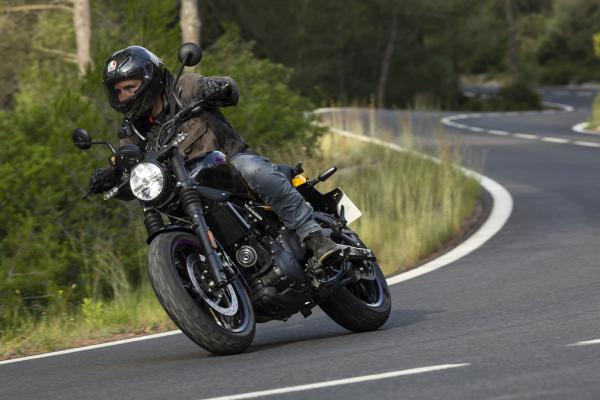
d644.jpg?itok=TY1iw0RZ)
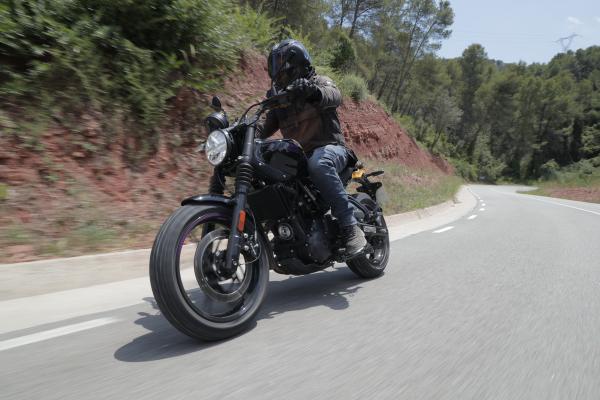
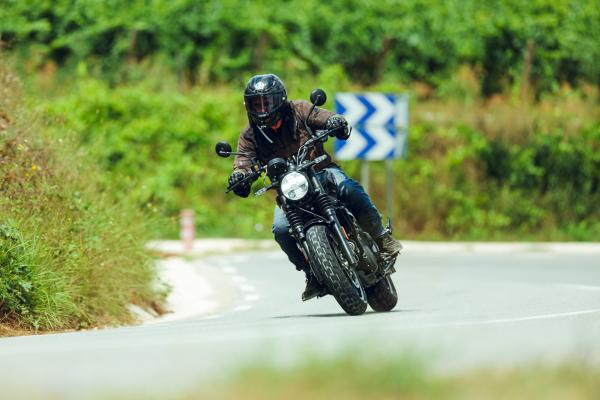
596a.jpg?itok=58LSk0m4)
e97e.jpg?itok=UINW5_38)
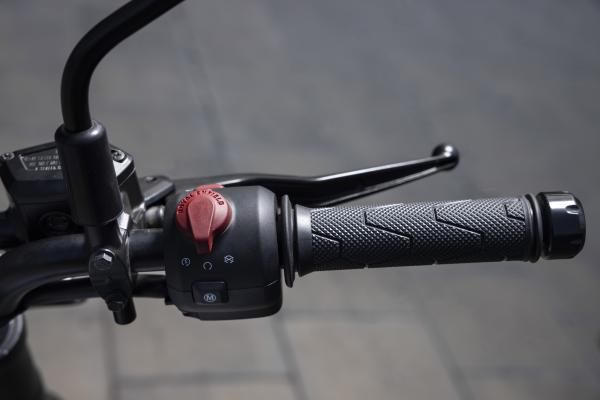
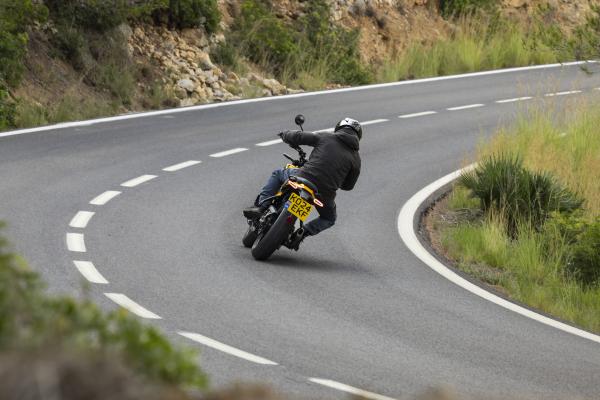
7a1e.jpg?itok=nJGf4A5k)
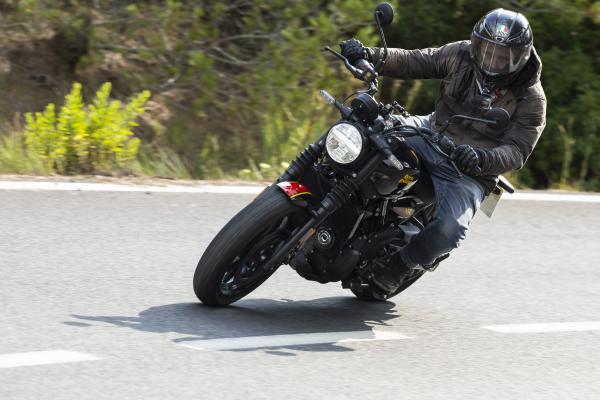
fc76.jpg?itok=xsJtsKAa)
